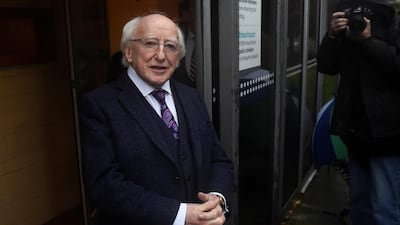Irish President Michael D Higgins used his annual Christmas message to appeal for the country to adopt a “spirit of hospitality” and welcome migrants trying to reach safety.
President Higgins urged Ireland to support people seeking to come to the country: “Today, many people turn to us – their fellow global citizens – for protection and shelter for themselves and their families, and for the provision of hope for a better future.”
The president also drew comparisons between Irish history and the movement of migrants and refugees in the present day: “Here in Ireland, we have our own long history of emigration, of movement, of journeys, of leavings and exile.”
President Higgins made references to the story of Mary and Joseph, which he called a “central theme” of Christmas, who sought “refuge” in Bethlehem but were told there was no room to accommodate them.
“Do we dismiss them from our door, telling them there is no room at our inn, or do we greet them in a spirit of hospitality, bearing in mind the history of emigration that is such a defining characteristic of the Irish people?”
The annual speech came at the end of a year marked by strain on the Irish asylum system.
Ireland’s Direct Provision system – a series of “accommodation centres” run on a for-profit basis by catering and hospitality companies under contract with the government – has been struggling under increasing numbers of asylum applications.
In September, a proposal to build a new Direct Provision centre in Oughterard, County Galway, in Ireland’s west, was opposed by thousands of protesters carrying placards labelling the system “cruel” and “inhumane”.
Critics of the system, which began in 1999, say it puts migrants in a state of limbo.
A 2013 report published by the European Commission against Racism and Intolerance found that 90 per cent of asylum seekers suffered from depression after spending six months in the system.
President Higgins also used his end of year message to address the need for action on climate change.
“The year has ended with a clear message from scientists that we must do much more to avoid catastrophe,” he said.
But the president hailed the wave of youth activism that has made headlines around the world in 2019.
“It was uplifting to witness our younger generation demonstrate their willingness to play their part in the collective action that is necessary.”


